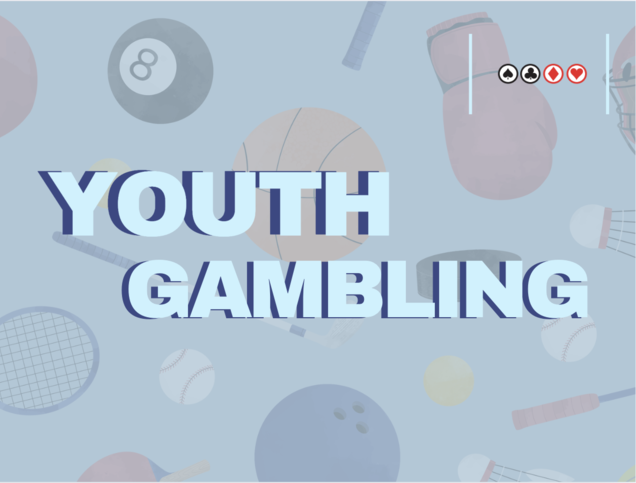Betting away the future: The surge in teen sports betting and its consequences

According to a recent study by JAMA Internal Medicine, the amount sports betting and people seeking gambling help since the 2018 Supreme Court case, Murphy v. NCAA has increased drastically. The court case began the process of legalizing sports betting.
Since that decision, there are now 38 states with operational sportsbooks — compared to one in 2017. The amount of sports wagers increased from $4.9 billion in 2017 to $121.1 billion in 2023. In recent years, Massachusetts has also seen an uptick in people seeking help for gambling problems.
“[Gambling] has definitely become more normalized in recent years, and the marketing that goes on to entice folks to gamble is overwhelming,” Wayland High School (WHS) Guidance Counselor Jim Girard said.
Gambling has also become more popular within younger generations, specifically high schoolers. In Massachusetts, it is illegal to gamble if you are under 18. However, high schoolers can get around this by doing online gambling and lying about their age. Some WHS students have reported seeing an increase in gambling around the school.
“I feel like gambling has recently been really promoted, especially on social media,” sophomore Max Berkowitz said. “Influencers online are gambling, which is promoting it to the younger kids.”
A new bill proposed in Massachusetts called the SD1657 could stop sports betting advertisements during sporting events that contain “language that misrepresents a customer’s odds at winning.” In other words, a commercial can’t claim that one has a good chance at winning a bet, when in reality they don’t.
The bill filed by Sen. John F. Keenan would also ban “in play” and “proposition” bets, which have been designed to promote addictive behaviors. “In play” and “proposition” bets both focus on betting on things during the game, instead of the traditional pre-game bets.
This law aims to address the growing issue of unhealthy gambling, which has been steadily increasing with the accessibility of online betting platforms. Gambling’s effects are evident in the way it’s handled, and the impact it has on individuals and communities.
“There’s a reason why Las Vegas has existed for 80 years now since the 1940’s,” former Head of Investment Relations for DraftKings Joe DeCristofaro said. “The house always wins, so it should be treated like an entertainment product, like going out to dinner.”
For some teens, gambling may seem like an appealing way to earn a quick dollar. However, gambling has been proven to cause serious consequences for young gamblers.
This happens because young adults with gambling problems may experience increased negative mood states, which may lead to depression, anxiety and suicidal ideation.
“Gambling can develop into a serious addiction very quickly and can be very dangerous,” Girard said. “[Gambling can lead to] depletion of savings [and] neglecting relationships with family, friends [or] significant others.”
The mental health dangers of gambling are just as evident, yet not as obvious as the danger of emptying out your wallet. According to the Commonwealth of Massachusetts, teens who gamble are more likely to use illegal drugs. Gambling is also linked to the highest suicide rate among all other addictions.
“[Gambling] can contribute to feelings of guilt, isolation and even suicidal ideation,” Girard said. “Self-care can often become an issue. Sleeping and eating habits [can be] negatively impacted and oftentimes the chances of developing other dangerous addictions, such as alcohol and substance abuse are [increased].”
Underage gambling is something that is evident in our society, and it has the ability to take away valuable experiences during kids’ teenage years.
“As a kid, [gambling] can distract you from things like your education, relationships and personal life,” Berkowitz said. “The choices that you make as a child really shape your life in the future, and gambling can steer you down a dangerous road of regret.”
Since the Murphy v. NCAA, there has been a visible surge in sports betting wagers. This happens as a result of sports wagers increasing from $4.9 billion in 2017 to $121.1 billion in 2023.
As a result of this uptick in gambling across America, some Massachusetts legislatures, like Keenan, are working to install an act that would be an attempt to prevent, or at least limit, the amount of sports betting in-state. Along with preventing harmful gambling advertisements, the SD1657 would act to prevent specific bets, which primarily promotes addictive behavior, as well as causing serious mental struggles in the futures of these gamblers.
Though gambling and betting may seem simple and straightforward, taking part in these types of activities, especially at a young age, could result in several mental and economical consequences in the future.
“[Gambling can teach unhealthy habits, foster reliance on luck rather than effort and potentially involve them in illegal activities, all of which have long-term negative effects on their development in future,” sophomore Hayden Duffy said. “It also strains relationships with friends and family, reduces time for productive activities and creates a cycle of risky behavior that is hard to break.”
Your donation will support the student journalists of Wayland High School. Your contribution will allow us to purchase equipment, cover our annual website hosting costs and sponsor admission and traveling costs for the annual JEA journalism convention.


